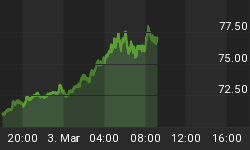China has an economic problem - inflation. When I speak of Chinese inflation, I am referring to what the People's Bank of China (PBOC, not to be confused with PB&J) is doing - creating massive amounts of credit "out of thin air." Chart 1 shows that the total assets on the PBOC's balance sheet grew by approximately 29% in the 12 months ended May. Although that is down from peak growth of 38% in the 12 months ended September 2005, 29% still is a sizeable increase in central bank credit creation.
Chart 1
What is driving this rapid PBOC credit creation? Chart 1 also sheds some light on the answer to this question. The blue line in Chart 1 is the proportion of PBOC total assets that are foreign related. As of May, approximately 70% of PBOC total assets were foreign related. Because Chinese government policy is to manage the Chinese exchange rate, especially with respect to the U.S. dollar, and because the U.S. dollar "wants" to fall in the global foreign exchange market, the PBOC is forced to buy dollars in order to keep the Chinese yuan from rising faster relative to the dollar. The PBOC pays for the dollars it purchases -- those dollars or the dollar-denominated investment instruments purchased with these newly-acquired dollars - showing up as foreign assets on its balance sheet - with Chinese yuan. And where does the PBOC get these yuan? The same place all modern central banks get their currencies - they create them with a stroke of a key. (One difference between central bankers and counterfeiters is that counterfeiters actually have to put a little work into creating currency - engraving and physical printing.)
What has been the result of all this PBOC inflation? As Chart 2 shows, more rapid increases in the prices of consumer goods and services and corporate stock prices.
Chart 2
The Chinese government has become concerned about the pick up in the prices of Chinese goods/services and assets. It wants these price increases to slow down. If rapid growth in PBOC-created credit is what caused the acceleration in Chinese goods/services prices, then a slower growth in PBOC-created credit ought to calm things down.
So, did the Chinese government instruct the PBOC to cut back on its credit creation directly? No. The Chinese government has instructed the PBOC to raise interest rates on Chinese bank deposits (the Chinese still have a version of the old Fed Regulation Q) and the interest rates on bank loans. Also, in order to encourage Chinese citizens to hold onto the rapidly growing deposits, which have been created by rapidly growing Chinese bank credit, which has resulted from the rapidly growing PBOC credit, the Chinese government has cut the tax on interest earned on Chinese bank deposits. Talk about a Rube Goldberg approach to reining in central bank credit creation.
Not only is this a convoluted way to manage monetary policy, it is destined to fail. As long as the PBOC attempts to prevent the Chinese yuan from appreciating at its "natural" pace versus the U.S. dollar, the PBOC will be forced to continue inflating. As Milton Friedman, may he rest in peace, used to say, there are simple answers to problems but not necessarily easy answers.
More Evidence of Spillover from Housing to Consumer Sector
We have been forecasting that the housing recession would have a negative knock-on effect on discretionary consumer spending. Six successive months of declining light motor vehicle sales is corroborating evidence of this. If J. D. Power has got its numbers correct, July is on course to mark the seventh consecutive month in which car and truck sales decline. This organization said that U.S. auto (and presumably, truck) sales were down 20.4 % from year ago in the first half of July. This sales decline comes with a 28% jump in cash rebates by auto makers. What is more discretionary than a Harley Hog? Harley -Davidson reported that its U.S. sales in the latest quarter were down 5.5% from year-ago. Another discretionary consumer item is a pleasure boat. To that, Brunswick Corporation, the world's largest maker of recreational boats, today cuts its 2007 profit and boat sales forecast. Inexorably, the tentacles of the housing recession are strangling the U.S. economy. Despite mounting evidence to the contrary, the Fed keeps saying that the housing recession is quarantined. Does it really believe this or is it so terrified about what might happen to the dollar if it were to cut rates to prevent a recession that it keeps up this Orwellian newspeak that there does not appear to be much negative spillover from housing to the rest of the economy.
















